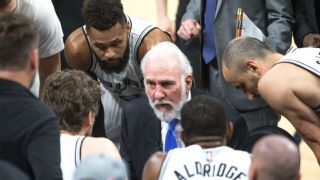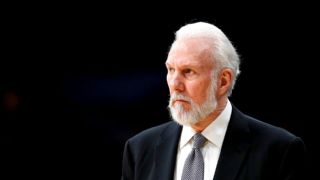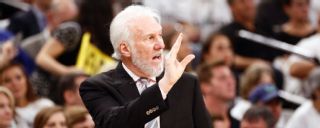|
FOR A MAN who loathes being probed for his inner thoughts, it's rather astonishing the degree to which Gregg Popovich publicly reflects on President Donald Trump. Three days after the 2016 presidential election, during the third week of the 2016-17 NBA season, Popovich unleashed a monologue of nearly six minutes during a routine media availability. The San Antonio Spurs coach asserted that his distaste for Trump wasn't rooted in partisanship, but in behavior. Popovich lambasted Trump for what he saw as the president-elect's bigotry, lamenting that half of the electorate ignored those moral transgressions in casting their votes. "I'm still sick to my stomach, and not basically because the Republicans won or anything, but the disgusting tenor and tone and all the comments that have been xenophobic, homophobic, racist, misogynistic," Popovich said. "And I live in that country where half the people ignored all that to elect someone. That's the scariest part of the whole thing to me." One day after Trump's inauguration and hours after the Women's March took place in dozens of American cities, Pop declared at a pregame media scrum that few parents would tolerate their kids articulating Trump's brand of prejudice. "All the things he said during [the campaign], if our children would have said it, we would have grounded them for six months. Without a doubt." Upon the firing of FBI director James Comey in May, Popovich said, "I feel like there's a cloud, a pall, over the whole country, in a paranoid surreal sort of way that's got nothing to do with the Democrats losing the election." He then added, "This individual, he's at a game show, and everything that happens begins and ends with him, not our people or our country." At media day in San Antonio on Monday, Popovich once again lit into the president. In regards to the Trump administration, he said, "The childishness and the gratuitous fear-mongering and race-baiting has been so consistent that it's almost expected." He called President Trump's rescinding of the Golden State Warriors' invitation to the White House "disgusting ... comical ... like a sixth-grader who was going to have a party in his backyard and he finds out somebody might not come, so he disinvites him." Popovich then decried the example that he believes the president has set: "Our country is an embarrassment in the world. This is an individual who actually thought that when people held arms during the games that they were doing it to honor the flag. That's delusional. Absolutely delusional. But it's what we have to live with. "So you got a choice: We can continue to bounce our heads off the wall with his conduct, or we can decide that the institutions of our country are more important, that people are more important, that the decent America that we all thought we had and we want is more important, and get down to the business at the grassroots level and do what we have to do." So what is it about Donald Trump that summons such visceral fury in the five-time championship coach? To understand that, it's worth delving into the core values Popovich has instilled in San Antonio over the past two decades.
IN THE HISTORY of NBA film sessions, few presented higher stakes than the one scheduled at the Spurs' training facility the morning of Tuesday, June 3, 2014. "Eleven o'clock comes around, and we all took our seats, and I remember walking into the room with a very focused mindset," Spurs guard Patty Mills says. "Everyone else seemed to have that same feeling. We're there to get a game plan in on how we're supposed to stop these guys. It's LeBron James and Dwyane Wade and Chris Bosh." The previous Saturday night, the Spurs had clinched their second consecutive NBA Finals berth by polishing off the Thunder in Oklahoma City. Popovich declared Sunday and Monday rest-and-recovery days in preparation for the Finals. The trauma of the 2013 loss to Miami was still raw. The rematch was fortuitous for its potential redemption, but a haunting callback to the most excruciating series loss in the NBA history. But rather than dive into the session with a strategic imperative, or even a parable on the virtues of resiliency, Popovich began by posing a question to the room. "He asks, 'Does anyone know what today is?'" says Mills, an Australian of Aborigine and Torres Strait Island descent. "There are a lot of different backgrounds in the room, but for me, obviously, I knew what day it was, but I didn't say anything. I just wanted to see where he was going with this." In Australia, June 3 is Mabo Day, a commemoration of the nation's most notable activist for indigenous rights. Mills was floored as Popovich proceeded to introduce Eddie Koiki Mabo's story to the team. A few minutes into the seminar, a picture of Mabo appeared on the video screen. "It was like the whole room just stood still for me, and I couldn't hear anything," Mills says. "It was hard to swallow, and it was one of those moments where I do realize how knowledgeable he is, and how he tries to bring his players out of the basketball world and give them a broad spectrum of what life is really like outside of this basketball bubble." The previous season, Popovich had asked Mills if he'd considered himself black. At first blush, Mills had found the question disarming, but he replied that he indeed does. "And then [Popovich] asked, 'Well, why?'" Mills didn't have a definitive answer for Popovich on the spot. But as he later thought about the question's demand for self-examination, he began to appreciate that Popovich regarded this kind of inquiry as every bit as important as pick-and-roll coverage. On one of the most important mornings in franchise history, Popovich hadn't started with basketball, but with empathy.
WHEN GREGG POPOVICH and the Spurs began to aggressively scout overseas basketball talent two decades ago, the primary goal was to exploit a market inefficiency in an NBA that still viewed international players with skepticism. But what started as opportunism quickly became an ethic for a franchise that counts diversity as a defining attribute. "I think that diversity, for us, has been important just as an intellectual and psychological exercise to widen people's breadth of experience just in the world, and I think that helps them develop a higher sense of camaraderie and willingness to want to understand each other, have empathy for each other, want to play for each other, be responsible to each other," Popovich told ESPN's Michael C. Wright in March.  As the team's head coach and senior executive, Popovich preaches that curiosity about people -- especially those unlike yourself -- provides not only a foundation for cultural literacy, but the building blocks of a better team. He invites Olympian John Carlos, who, along with Tommie Smith, hoisted the Black Power salute from the podium in 1968, to address the Spurs. Popovich briefs the team on the Innocence Project, which appeals criminal convictions with the aid of DNA evidence. His players are routinely recommended reading. In SpursWorld, unfamiliar ideas are to be explored, then discussed with those who will challenge your assumptions honestly. And nowhere is this more true than at the Spurs' team dinner. Those who dine with Popovich describe meals that consist of no more than 25 percent basketball conversation and ideally fewer than six people. He's wholly uninterested in small talk. And basketball small talk? That's the lowest form of dialogue. A dinner table, like a film room, is an opportunity for continuing education, and anyone without the requisite interest is free to sample the Four Seasons' excellent room service. "If you want to participate in the conversation, you better have read something, learned something, brought something to the table and have something to teach," says Hawks head coach Mike Budenholzer, a former longtime assistant under Popovich. Henry Cisneros, former San Antonio mayor and Secretary of Housing and Urban Development under Bill Clinton, remembers breaking bread in 2014 with the former president, Julian Castro (Barack Obama's HUD secretary) and Popovich at Mi Tierra, one of the city's venerable Mexican eateries. Despite the three high-level pols, Cisneros remembers the basketball coach -- who graduated from the United States Air Force Academy with a degree in Soviet studies -- as the heavyweight. "It was Popovich who was the center of attention, because the president wanted to talk about international affairs, and Pop was incredibly informed," Cisneros says. "We talked about North Korea, we talked about China, we talked about Europe, we talked about the Russian role in Europe. And the president was listening to Gregg Popovich. The president is infinitely knowledgeable on these subjects, but he wanted to know what Gregg thought." Those who've observed Popovich's management style closely reveal a professorial spirit who sees coaching as a craft that extends far beyond the court. As if he's constructing a syllabus, Popovich spends considerable time each summer and throughout the season mulling potential themes to present, connecting them not only to what's going on in the world, but finding the Spurs-specific thread. "The conversations he brings to our team and his desire to get our team to think of more than themselves is well-thought-out," longtime Spurs general manager R.C. Buford says. "The way he teaches values and the way he understands respect -- it's just something you take in," Mills says. To succeed, by this creed, an organization like the Spurs needs not just to tolerate diversity, but to elevate it. In Popovich's eyes, this makes the San Antonio Spurs a hallowed place and an entity to be protected. "Pop represents the most multicultural team in the most multicultural league and it goes even deeper than that," says Utah Jazz general manager Dennis Lindsey, a Spurs alum. "It's a point of pride."
'X' FOR PRESIDENT! has been a meme since long before the birth of social media. Americans have long been enamored by the idea that mastery of one field could empower someone to save our democracy. But recently, Americans have let it be known that they're not just being cute -- they're dead serious. They want outsiders, those who've succeeded in the private sector, those who've crafted public personas in mass media. And to judge by last year's election, not just any public persona, but one untroubled by what has traditionally been regarded as politic. And it's worth noting that if either major political party were designing a presidential candidate in a laboratory, the candidate might look something like this: born in the industrial belt, where elections are won or lost. The son of immigrants. A graduate of one of the nation's flagship military academies. A veteran of a key intelligence agency. The top executive at a firm valued above $1 billion. This is the well-tailored biography of Gregg Popovich, and in our current political climate, it's far from the thinnest premise for a major political campaign. Celebrity outsiders have been emboldened by Trump's electoral success, with the likes of Mark Zuckerberg, Mark Cuban and Dwayne Johnson rumored to be exploring presidential runs. Popovich enthusiasts have even taken to merchandising a potential candidacy. Warriors coach Steve Kerr, who played for Popovich for four seasons, says, "Everybody is eligible, so why not a basketball coach?" It is, at the very least, amusing to imagine Popovich channeling his indignation into high-grade political attacks on the incumbent. Pop thundering away in Des Moines, not to a midseason media scrum at the AT&T Center, but to a crowd of partisans hungry for a candidate to voice their disgust. Pop on the debate stage, flicking away his opponent's base insults like a bad postgame question. The fan fiction writes itself. "He's offered a running commentary on some of the developments of the last year, and they're very thoughtful in long form," says David Axelrod, the chief strategist for Obama's presidential campaigns, when asked to genuinely consider the notion of a Pop for President movement. "The one thing he does have that is both a strength and a liability is that he's utterly authentic. Just having watched from a distance all these years his interactions in public, I've never heard him utter a word that made me think he wasn't being completely honest." Axelrod met Popovich during a Spurs visit to Chicago, noting -- as several others have -- that the television in the visiting coach's office was tuned to news, rather than ESPN or NBATV. Yet for all of his assets, the stirring bio, the credentials as a leader, Axelrod -- who knows a thing or two about the viability of presidential campaigns -- believes that Popovich carries a singular fatal weakness. "One thing you have to do when you run for president is be revealing of yourself," Axelrod says. "If you're unwilling to talk about yourself -- which he really is -- that's a real liability. Humility has its limits if you're running for president." On numerous occasions when asked what the Spurs look for in personnel, Popovich has stated that the organization likes people who "are over themselves." Run for president? That's an impossibility. Axelrod cited his most successful client as a case study. Though the 44th president had an introverted streak and a notorious dislike for the retail politics that energized Clinton, Obama enjoyed sharing his story. "[Popovich] doesn't like to play to the fans," says Brad Parscale, Trump's digital director and a resident San Antonian. "If you're going to be a politician, you have to play to the voters. It's politics. You're constantly having to explain yourself. You're being interviewed all day. People are telling you what to do, what to say." The Spurs have managed to rack up five championships without muddying themselves with the salesmanship and branding that are prerequisites for electioneering. But presidential politics is more a postseason podium than it is a fourth-quarter huddle. The tools of leadership might translate to governing, but running requires the suffering of fools and the willingness to humble-brag. "[Popovich] doesn't utter an inauthentic word," Axelrod says. "He doesn't say stuff he doesn't feel or believe. And he doesn't hesitate to call out things that disturb him. It's all really appealing. But I just think the level of annoyance and irritation associated with running for president -- he'd last about 10 minutes."  WHICH BRING US back to our original question: If Gregg Popovich isn't hurling broadsides against President Donald Trump as a means of greasing the skids of a political campaign, why is he so tweaked by the man? "He is genuinely concerned about the well-being of the team, the country, of the whole," Budenholzer says. "He's constantly thinking of every person in sum total, and what affects what. There's an incredible sense of what is best for everybody. He's weighing how to get there, the pros and cons, and how to navigate people's concerns and needs, and about getting people to sacrifice." Popovich has been selectively passionate in public commentary, whether speaking about the anti-gay slurs directed at referee Bill Kennedy or Zaza Pachulia's recklessness on the court. Yet Trump ignites a strain of disgust that goes beyond periodic political expression or a specific grievance. Orlando Magic assistant Chad Forcier, who spent nine seasons on Popovich's staff, suspects it's a values thing. "It's [Trump's] disregard for the highest office in the land," Forcier says. "His arrogance, lack of humanity, disrespect for others -- all the human traits that Pop believes are non-negotiable for all of us, and especially the president." "I think [Popovich] sees somebody in the most important job in the world who completely lacks that much self-awareness and awareness of others and it drives him crazy," says Kerr, who himself made one of the boldest public critiques of Trump in his own broadside on Sunday at SI.com. "It's that combination of compassion and generosity and empathy. And dignity is really, really important to Pop." As much as any franchise in professional sports, the Spurs place a premium on continuity -- as well as the belief that when it comes to making decisions, principle should take precedence over politics and the vagaries of the moment. You will sit when it's time to sit, tonight's results be damned. And you will sublimate your ego to an entity that's bigger than you. Gregg Popovich has spent his life devoted to two institutions -- the San Antonio Spurs and the United States of America. If the principles that have guided one can guide them both, the NBA's senior statesman could return to his preferred mode: public silence.
|


